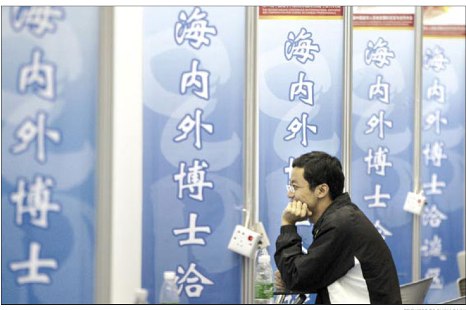Focus
Chinese firms put foreign degrees under a microscope
By Zhao Yanrong (China Daily)
Updated: 2010-07-26 13:50
 |
Large Medium Small |
|
 |
BEIJING - Chinese employers and job agencies are scrutinizing foreign degrees more closely, following a much-hyped scandal about the bogus degree of one of China's best-paid executives.
The former president of Microsoft China, Tang Jun, who was reputed to be earning 100 million yuan (about $14.8 million) a year, has been accused of buying his PhD from Pacific Western University (PWU), an alleged diploma mill, in the United States.
Wang Jian, spokesman for 51job.com - a Chinese job website - said employers are developing stricter procedures to verify the international education background of applicants.
"Except for world famous universities, most overseas institutions are now not considered to be much better than local universities," Wang said.
International degrees might give applicants a better chance to be called for an interview, but their performance during the meeting is crucial to get the job, he said.
Datang Power, a major electricity generator in China, is "beefing up the scrutiny of the qualifications of applicants".
A human resources manager at Datang Power, who declined to be named as he's not authorized to speak to the media, said the Tang scandal is "a good reminder to us" and removes the halo of overseas-educated Chinese, or "sea turtles" as they are known in China.
"We shouldn't blindly worship a foreign degree," he said. "We would prefer graduates from good Chinese universities to sea turtles from unknown foreign ones.
"If the applicant's alma mater is unknown, we will Google it for details."
One reason for the problem is believed to be a company's trust in an applicant's foreign degree, despite a Chinese government facility that allows verification of a degree from an overseas institution.
Foreign degree holders returning to China can apply for a "verification certificate" in which the university's bona fide would be checked.
Unfortunately, many companies don't ask for the certificate and instead are happy to sight only the applicant's degree papers.
In Zhejiang province, in eastern China, about 10 percent of the 3,000 people who apply every year to get their degrees verified fail to get the certificate.
This is because their schools were not accredited by education authorities in those Western countries.
Several Chinese company executives are reportedly to be holding unaccredited degrees from American universities.
Chen Hua, vice-director of Wiseway International Education Agency, said most unaccredited universities are new, which rent buildings and do not have enough teaching equipment and personnel.
"They have very low enrollment requirements, which means the their education quality is not good enough," she said.
However, Chinese executives still regard these universities as a shortcut for foreign degrees, which they believe will help their careers.
"They regard a degree from an overseas university as a way to improve their resume," said Chen, who has been helping people seek international education for more than 10 years.
Another problem is the difficulty for students to gain entry into Chinese universities, due to limited resources.
"Countries such as the US have more opportunities than China," Chen said. The US, has more than 4,000 universities and colleges for a population of 310 million, while China has 2,000 or so universities for its 1.4 billion people.
"Higher education programs such as MBAs and DBAs are even fewer, despite a strong requirement for those programs in China."
Liu Baoquan, professor from the Institute High Education at the Beijing Normal University, said the improvement of China's higher education has been too slow to meet the needs.
Those who use foreign diploma mills said they, too, are victims.
A chairman of a biotechnology company in Shanghai, who didn't want to be identified, attended the same school as Tang - PWU - in 2002. He said he spent two years at the campus of Peking University in Beijing to gain a DBA degree, issued by PWU.
"It's hard to believe that our degrees were not accredited, since we did see a few certificates of the university before enrolling," he said.
However, PWU has never been on the database of accredited post-secondary institutions and programs under the Department of Education in the US.
The degree scandal has also prompts a mindset revolution.
Li Yujiang, an MBA student from Tsinghua University in Beijing, said the controversy shattered China's blind worship of foreign degrees, amid China's rising economic clout.
"When more Chinese have international education backgrounds, we will know better about overseas schools and degrees," said Li, who works as a team leader with IBM China.
"In 10 years, such low-quality or false degrees from overseas will no longer be acceptable by most companies."
Li said the process of learning is more important than the degree.
"High-level education like MBAs and DBAs is a good chance to build up a potential social network and share some good working experience," he said.
"The capacity to develop our business is more important in the real world."
China Daily